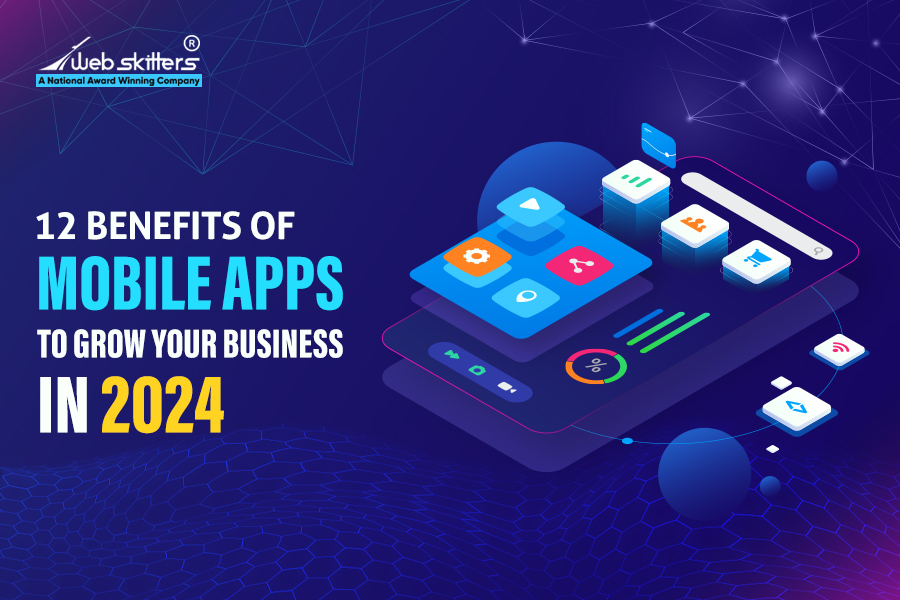
12 Benefits of Mobile Apps to Grow Your Business in 2024
We cannot function without mobile devices now, can we?
Smartphones and mobile devices have become a constant necessity in our daily lives. We operate these devices and the various applications for daily activities.
Smartphone penetration has been remarkable over the decade. The increasing need for functional mobile apps is on the rise as well. This introduced considerable functions and innovations, making digital interactions and daily activities easy.
For businesses, how does this translate? Do they need a mobile app?
As we approach 2024, businesses do not have the luxury to opt out of having a digital presence. A website is crucial for digital growth and success. Mobile apps are an elevated scope of success. The functional mobile application plays an impactful role in the success, sales, and revenue of brands.
Building a brand-new mobile app is a lucrative and significant commitment to a business. It is vital to have an in-depth knowledge of the benefits of mobile apps and their capacity to add value. So, what are the benefits of a mobile app for a growing business?
In this comprehensive read, we will delve into the advantages of mobile app development for businesses. We will also discuss tips and tricks to identify the ideal mobile app development company for assured success.
The Significance of Mobile Apps for Business
The need for quality mobile app development services is expanding to meet the growing need for mobile apps for businesses. The apps are custom-designed software applications that run on wireless computing devices like Smartphones and tablets.
Among the several benefits of having a mobile app, convenience is the top-most advantage. It offers a quick platform for users to interact with a business presence and functions appropriately in unstable connections.
With 310 million Smartphone users, dedicated mobile apps are a must-have for businesses. It offers a smoother user experience and allows users to stay ahead of the competition. A diligently developed mobile application increases brand visibility and opens doors to increased revenue.
Mobile application development has come a long way to provide brands with the added advantage of visibility. The present-day apps are feature-rich and enhanced and offer multitudes of functionality.
You will be thrilled to learn that mobile application development dates back to the late 20th century. The first Smartphone was IBM’s Simon, launched in 1994 with ten built-in applications. It comprised basic games and utilities like calendars, calculators, and arcade games.
Next in line was the Nokia mobile with the infamous game Snakes, launched in 1997.
The year 2007 saw the launch of the first iPhone, with inbuilt apps like weather, maps, and many more.
User behavior altered, and to meet changing expectations, the mobile and apps industry evolved. Users demanded more features, games, and functionalities. In the year 2008, Apple’s app store and Android market launched. In a year, each marketplace had experienced 1 billion downloads.
After this, it was a whirlwind of new mobile applications to offer maximum ease to users. Today, there are 8.9 million mobile apps. Google App Store is the largest app store with 3.5 million apps, followed by 1.6 million apps in the Apple App Store.
Today, mobile applications play a significant role in businesses to acquire dominance in the digital space. The majority of brands are investing in mobile app development services for dedicated applications to stay relevant amidst the competition.
If you are a growing business reading this, this might be the perfect time to plan for a mobile application!

Reasons Why Your Business Needs a Mobile App
Users spend 90% of their internet time on mobile apps. For a business, these apps are the best means of communication with their target audience.
The digital domain is flooded with high-functional, feature-rich mobile apps offering a multitude of advantages to businesses. The apps are convenient platforms for interaction and possess a forward approach towards a user-centric competitive edge.
Here are 3-robust reasons why your business needs a mobile app
- Mobile Apps Facilitate Customer Engagement
It has been observed through years of digital business, that it is easier to retain an existing customer than to attract a new one. Well-developed mobile apps have several features to retain customers to their brand journey.
Some of the tried and tested methods of customer retention are email marketing and messaging. However, nothing is as impactful and personal as push notifications.
Push notification is a fine example of quick interaction with customers to bring them back to the app journey.
Another added advantage of mobile apps over websites in terms of engagement is the lack of distraction. Mobile apps present a distraction-free browsing experience and lead to reduced abandonment rates.
- Mobile Apps Offer Accessibility and Convenience
Stats suggest that millennials interact with an app over 50 times every day and with 9 different apps daily. 110 billion hours are spent on shopping apps annually. An average American spends 5 hours on their mobile. 75% of users immediately check on their mobile devices upon receiving a notification.
The above statistical data means the target customers will interact with brand apps rather than the websites. These apps are convenient and accessible and offer a seamless user experience. They work effortlessly in low-network coverage areas and are available offline as well.
- Mobile Apps Enhance Brand Visibility and Recognition
There are several ways to enhance brand visibility – organic marketing, website redesigning, search engine optimization, and many more. However, mobile apps have proven to be the most powerful, offering the highest return on investment.
Mobile app development ensures a brand is creatively portrayed in the digital sphere, focusing on the target audience’s expectations.
The app offers a far more significant and personalized experience than a website. It leads to a unique brand experience and visibility, fortifying trust and reinforcing brand recognition.
Advantages of Mobile App Development
The goal is not just a mobile app for users. The objective is an efficient, feature-rich, and scalable mobile application rendering a positive momentum for business growth.
Mobile applications have become a necessity as another year approaches. Be it shopping needs or groceries, users are inclined to responsive and functioning mobile applications that make the journey easier. For businesses, this translates to increased traffic, improved customer relationships, and a hike in sales and revenue.
A top-notch mobile development company understands the advantage of quality mobile app development for businesses:
- Enhanced Customer Loyalty
Quality mobile app development entails customization and personalization, making each brand app unique.
For the customers, these apps are communication platforms and set the standard impression. A well-curated custom mobile application offers personalized content and increases engagement.
It offers users a brand view based on behavior, elevates satisfaction, and enhances loyalty. This leads to higher numbers of returning customers and reduced app abandonment.
- Increased Sales and Revenue
Quality apps are all about enhanced user experience and smooth navigation. This enables customers to effortlessly complete their journey. When effectively built, keeping in line with convenience and user behavior, mobile apps can boost sales and multiply the revenue.
Mobile apps also enable conversions on the go, meaning, a consumer can interact with you anywhere and everywhere. This increases the possibility of conversion compared to brands devoid of mobile apps.
- Competitive Edge
This is the age of mobile devices, regardless of the business niche. Among the slew of industry rivals, a contemporary mobile app enables the various possibilities of dominating the market. When websites were the craze, the objective was a web presence that offered users the ease of interaction from the comforts of home.
Now that we are in the app era, it promises a distraction-free digital presence far more convenient and swift than websites.
Added to that, mobile app development comes with enhanced strategies for commercial success. This means businesses must not stop at a functional application. Rather, implement strategies to make the apps a success.
This includes immaculate customer service, loyalty programs, marketing strategies, etc.
When hiring a mobile app development company, ensure they have industry experts in their team and have sound knowledge of mobile app trends.
Benefits of Mobile Apps for Small Businesses
As a small business venturing into the digital realm, the idea of launching a mobile app can be intimidating. There are tons of information on the internet, primarily for large-scale businesses.
Small businesses differ from large-scale businesses on a few aspects – largely budget and resources. It is essential to understand the expenses involved in managing a mobile. There are development charges and marketing costs involved. However, benefits like efficient operations and targeted marketing help a small business scale.
So, is it beneficial to have a mobile app as a small business?
To make it easier for your understanding and decision-making, here are the benefits of mobile apps for small businesses Explained –
- Cost-Effective Marketing
Mobile App marketing strategies are a significant step toward gaining a competitive advantage in the digital sphere. However, these are not as expensive as a small business may think.
There are multiple methods of app marketing – App Store Optimization, User Onboarding, App Advertising, and more. All of these are budget-friendly methods of promoting a mobile application.
For instance, ASO services range from $1000-$2500 a month, and User onboarding costs depend on the UI/UX design charges, ranging from $40-$60 an hour. The initial costs are worth it since mobile apps have a higher ROI and success rate in attracting organic traffic.
- Streamlined Operations
Mobile apps are an efficient medium to automate several business processes. The apps reduce manual involvement and enhance business efficiency.
Small businesses that have transitioned to mobile applications have experienced improved and seamless communications with the workforce, as well as, improved customer engagement.
These apps are a direct medium to engage with potential customers, gather reviews and feedback, and curate personalized brand solutions.
- Targeted Marketing Strategies
As already discussed, mobile apps are a direct medium of customer engagement. It is easier to gather user data and understand the various personas to develop effective marketing strategies.
A well-constructed mobile is a distinguishing factor for a small business. The personalized features offer a unique value proposition that users find attractive. Targeted marketing and engagement methods attract and retain the ideal customers.
Marketing has always been the most essential part of a business, especially a small business. However, it is crucial for mobile apps. The majority of the potential customers are on their mobile devices.
They heavily rely on the information they receive through these devices. Brands that are available as mobile apps are psychologically trusted more than brands with just websites.
Mobile App Development Services and Companies
For a business planning to launch its first mobile application, it will exponentially alter how the owners measure the brand’s success and plan future strategies. Amidst all these plans, mobile app development plays a consequential role.
Mobile apps resolve user problems and make their brand journey seamless. This applies to multiple sectors – retail, finance, banking, and so on. The apps are convenient, enable user interaction on the go, and are accessible. Quality mobile app development services contribute to making all of these possible.
Hiring a team of mobile app experts provides brands with numerous benefits. Here’s why you need a professional mobile app development company for your business mobile app
- Professional Efficiency – A renowned mobile app development company has the necessary technical expertise to launch a high-functioning mobile app. They are accustomed to various languages and frameworks and can develop robust app solutions.
- User-Centric Development – A brand and the development company must understand that the user is of the highest importance.
Understanding user behavior and developing a mobile app accordingly is essential for business success. An effective mobile app development entails an intuitive and user-friendly interface that offers users a positive experience and appeal.
- Custom Development Solutions – Not all businesses have similar app service requirements; it depends on the company size. A seasoned mobile app development company understands the need for custom app solutions to align with business needs. This translates to custom apps that have a specific target audience and are developed to meet objectives efficiently.
- Cross-Platform Availability – Experienced mobile app developers understand the need for cross-platform app development. Business apps available across platforms increase the scope of the application and engage a wider audience base.
- Assured App Quality – Mobile apps are an incredible platform to attract new consumers and amplify the ROI. However, mobile apps must be reliable and have quality.
App development companies perform rigorous tests, and A/B testing to ensure the mobile app is free from glitches and technical errors. A flawless app is remarkable for a small business and delivers a positive user experience to enhance brand growth.

Choosing the Right Mobile App Development Company
If you are wondering how to pick the perfect mobile app development company, here are a few handy tips and tricks. There are several mobile app development companies that you can find at your fingertips on Google. However, there are key components that make a mobile app development company best in class. These key aspects determine the success of the developers and the business app.
The crucial aspects of finding the right team of experts for your small business mobile application
- The Portfolio – The most effective reliability indicator of a mobile app development company is the portfolio. It highlights their experience in app development, the various industries they have served, the various clients, and their technical expertise in the domain.
- Reviews – An app development company can have a massive number of clients and a portfolio. This does not guarantee a quality mobile app development service. Client reviews are the truth you need as a business.
- Development Process – An ideal mobile app development company follows an agile methodology in developing mobile apps while keeping the business decision-makers in the loop. It ensures all the objectives are accomplished and the steps are diligently completed.
- Experience – You can hire a small development team or a large-scale app development agency. It does not matter which company size you choose, the ultimate factor is the experience. Their skills and experience will reflect on your business app and determine its success.
- Support – Similar to other technologies, mobile applications also experience changing trends and innovations. A brand new mobile app can soon become outdated amidst the constantly evolving domain. Hence, it is mandatory to pick an app development that offers post-launch support, upgrades, and necessary fixes.
Comparing the various app development companies can be overwhelming if you are unsure of the comparison aspects. These key pointers will help narrow your choices and make an informed decision.
12 Benefits of Mobile Apps for Business
So far, we have understood the importance of having a mobile app in this digital age. Let us take you through the twelve pivotal advantages mobile apps offer businesses.
We will also discuss how these mobile reshape the landscape of business operations and customer relationships.
- Enhanced Customer Engagement
Mobile apps are a dynamic bridge, connecting businesses with their customers in real-time. Through engagement features like push notifications, brands can circulate timely updates, promotions, and personalized content. This facilitates a continuous and interactive relationship with the customer and leads to increased engagement and satisfaction.
The market penetration of mobile devices has ensured that users are constantly connected to the digital space. This phenomenon provides businesses with a straightforward opportunity to engage with potential customers.
Imagine a retail app sending a personalized notification about a flash sale to a user who has previously shown interest in similar products. 72% of consumers prefer personalized updates rather than generic ones. This instant notification captures attention and encourages immediate action, thereby boosting customer engagement.
- Increased Brand Visibility
There are myriads of apps in the store that users can freely download and operate. How do these apps compete?
A strategically designed mobile app residing on a user’s mobile device is a brand ambassador. The constant visibility cultivates brand recall, ensuring that the business remains top-of-mind amidst the multiple choices available to consumers.
Consider a scenario where a user scrolls through their apps and spots your business logo. Even if they don’t open the app at that moment, the presence establishes a connection. The visibility becomes particularly potent when a user seeks a product or service within your business domain. The app’s icon becomes a familiar and trusted symbol, prompting the user to explore further.
- Boosted Sales and Revenue
Mobile apps offer a streamlined and efficient platform for transactions. With in-app purchase options and secure payment gateways, businesses witness a substantial surge in sales and an increase in revenue.
The convenience of mobile payments has revolutionized the way consumers make purchases. An e-commerce app, for instance, allows users to browse products, add them to the cart, and complete the entire transaction seamlessly within the app.
This frictionless experience encourages impulsive buying and enhances the overall satisfaction of the purchasing process.
- Customer Loyalty Programs
More than 90% of brands have active loyalty programs. These programs deployed within mobile apps incentivize returning customers. Reward points, exclusive discounts, and personalized offers create a sense of loyalty among users. It transforms a one-time customer into a steadfast loyalist of the brand.
Think about popular retail apps that reward customers with points for every purchase. These points can be redeemed for further discounts or gifts. Such loyalty programs create a compelling reason for customers to choose the same app consistently.
While being a tool for transactions the app becomes a source of tangible benefits, encouraging a loyal customer base.
- Data-Driven Decision Making
50% of users open an app 11 times through the time. During these sessions, the mobile app collects data that offers invaluable insights into customer behavior and preferences.
This data is a wealth of information and empowers businesses to make informed decisions. User data also helps in refining marketing strategies and continuously improving the user experience. These factors contribute to the overall success of the enterprise.
Analyzing user data allows businesses to understand customer preferences, purchasing patterns, and even the most frequented app features. For instance, a food delivery app might notice a spike in orders during weekends.
Armed with this information, the business can strategically plan promotions or optimize resources to cater to increased demand during specific hours.
- Global Market Reach
Mobile apps omit various demographic constraints, providing businesses the scope to reach a global audience. All age groups find mobile apps more navigable and easily operable compared to websites.
The expanded market reach opens up new avenues for growth and diversification. It also allows enterprises to tap into untapped markets.
A language learning app, for example, can cater to users worldwide without the need for physical presence.
The app can offer courses in multiple languages, adapting content to suit diverse cultural preferences. This global accessibility broadens the user base and positions the business as a global player in the industry.
- Streamlined Communication
68% of consumers are willing to stretch their budget for brands that offer immaculate customer service. Mobile apps are a boon in such a scenario.
In-app messaging and chat features facilitate seamless communication between businesses and their customers. This fosters a quality relationship between the two and enhances retention.
Quick responses to queries or concerns further increase customer satisfaction and build trust.
Consider a customer support feature within a banking app. Users can inquire about transactions, report issues, or seek assistance directly through the app.
The ability to communicate seamlessly without switching to external channels saves and enhances the overall customer experience.
- Efficient Marketing Channels
Mobile apps are powerful marketing tools equipped with features such as targeted notifications, personalized content, and social media integrations. These enable businesses to execute more effective marketing campaigns leading to increased brand visibility and customer engagement.
Imagine a fitness app leveraging push notifications to remind user about their daily workout session. Targeted notifications based on user preferences and past engagement promote the app’s features. This fosters a sense of community among users, enhancing engagement.
- Competitive Edge
Embracing trends and technological innovations provides businesses with a competitive advantage. It attracts tech-savvy customers and makes the brand forward-thinking and innovative. Staying ahead in the tech game ensures that your business remains at the forefront of the industry, securing a competitive edge over rivals.
For instance, consider two restaurants in the same neighborhood—one with an intuitive food ordering app and the other relying solely on traditional methods.
The former, with its tech-savvy approach, will swiftly attract the younger demographic and be considered a modern and convenient choice. Amidst the competition, this simple feature will offer the brand a competitive edge.
- Improved Customer Experience
74% of consumers convert based on experience alone. User-friendly interfaces, personalized content, and intuitive navigation contribute to an enhanced customer experience. A positive app experience satisfies customers and helps in brand avocations to actively promote the business.
Think about a travel app that offers a seamless booking experience, personalized travel recommendations, and real-time updates. The combination of these features makes the app indispensable for users.
It encourages them to share their positive experiences with friends and family, organically expanding the app’s user base.
- Efficient Business Operations
Mobile apps streamline business processes. It reduces manual efforts and enhances operational efficiency. From inventory management to customer relationship management, mobile apps offer a centralized and efficient solution. A well-constructed mobile application saves time and allows businesses to allocate resources more effectively.
Consider a construction company using a project management app. The app facilitates real-time collaboration among team members. It can track project progress and streamline communication among peers.
This minimizes the risk of errors and optimizes resource allocation, ultimately contributing to more efficient business operations.
- Adaptability to Trends
Mobile applications are flexible when it comes to quick updates. The updates incorporate the apps with the latest trends and technologies. This adaptability ensures the business remains relevant in a rapidly evolving digital landscape.
Staying in tune with emerging trends allows the brands to remain responsive to market demands, contributing to sustained success.
An example of this adaptability is gaming apps that continuously introduce new features, challenges, and graphics to keep users engaged. By staying abreast of the latest gaming trends, these apps maintain their popularity and relevance. This showcases the importance of adaptability in the competitive app market.
The adoption of mobile apps is not a trend but a strategic imperative for businesses aiming to thrive in 2024. The benefits outlined above underscore the transformative impact that mobile apps have on businesses.
Starting from enhanced customer engagement to increased sales, mobile apps are a constant part of business success and scalability.
As technology advances, businesses that utilize mobile apps will undoubtedly be at the forefront of innovation and growth.
Investing in Mobile App Development
If you consider the steady growth of the Mobile App market and the penetration of Smartphones, the need for a functional mobile app is indispensable. For a growing business, mobile app development plays a significant role in establishing a steady platform for success. These mobile apps double the revenue, attract more customers, and boost business growth.
As we focus on the various benefits of a mobile app, it is safe to conclude that investing in quality mobile app development is a smart strategy in the upcoming year.
Planning to venture into the mobile apps domain? Webskitters Technology Solutions Pvt. Ltd. is the development partner you need. With a team of exceptional developers, we offer top-tier mobile app development services to various industries. Our mobile app experts help you build steadfast business strategies that enable scalability and long-term success.
What’s the wait for? Consult today for your first mobile app!

 Ecommerce Development
Ecommerce Development 













